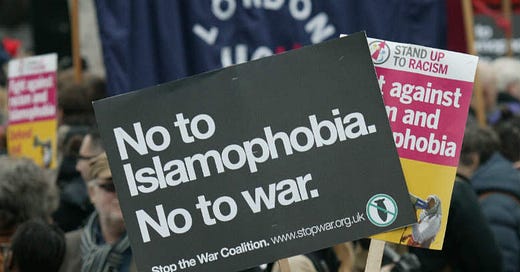It didn’t take long for the Australian Newspaper to hop on the propaganda bandwagon of spreading anti-Muslim sentiment and hatred following the New Orleans and Las Vegas attacks.
Yesterday, I published a piece entitled False Flags Suspected: CIA's Hidden Hand in New Orleans, Vegas Attacks. It examined the likelihood of who was really behind the bombings. As usual, The Australian’s recent piece framed the attacks as a resurgence of ISIS-inspired terrorism, dangerously perpetuating a narrative entrenched in Islamophobia and uncritical acceptance of US foreign policy objectives.
Joe Kelly’s piece is riddled with speculative assertions and alarmist rhetoric, serving as a mouthpiece for a propaganda campaign aimed at justifying further militarisation and intervention in the Middle East.
His claim Shamsud-Din Jabbar was inspired by ISIS raises several interesting questions. While President Biden’s administration has linked the attack to ISIS, the evidence remains superficial at best. Jabbar’s background as a US Army veteran complicates the narrative of simple “Islamic radicalisation.” Veterans, often grappling with PTSD and systemic neglect, are vulnerable to psychological breakdowns—a factor the article conveniently overlooks.
Portraying ISIS as a resurgent threat intent on targeting Western nations distracts from more pertinent issues. The group has largely shifted its focus to regions like Africa, where systemic instability and Western exploitation create fertile ground for recruitment. Framing ISIS as a direct threat to the US ignores geopolitical realities, especially when it’s a creation of the CIA and the US.
Leaning heavily on fearmongering, The Australian portrays Muslim populations throughout the West as susceptible to radicalisation. Its rhetoric echoes Islamophobic tropes that demonise entire communities while ignoring the socio-political contexts that foster extremism. An example is the ongoing atrocities in Gaza—including the displacement of families and the bombing of residential areas—which fuel resentment and despair, conditions extremist groups exploit.
Instead of addressing these root causes, the narrative shifts blame entirely onto Muslim communities, perpetuating stereotypes and deepening societal divisions. This deliberate approach alienates these communities and undermines efforts to address the real drivers of extremism: systemic injustice, imperialism, and militarisation.
Invoking ISIS and al-Qaeda aligns neatly with the “War on Terror” playbook that dominated US foreign policy post-9/11. By reigniting fears of terrorism, the groundwork for renewed military interventions throughout the Middle East is laid.
Peter Jennings’ assertion that “the terror threat is higher than we’ve been imagining” is speculative and alarmist. The framing conveniently aligns with military-industrial interests, which benefit from sustained conflict. The fear of “lone wolf” attacks, amplified in the media, distracts from the systemic violence that claims far more lives than isolated incidents attributed to extremists.
What Kelly’s article glaringly omits is the role of US foreign policy in creating the conditions for extremism. The New Year’s Day attack occurred against the backdrop of ongoing US airstrikes in Syria and support for oppressive regimes. America’s actions exacerbate instability, displace communities, and fuel anti-Western sentiment—conditions extremist groups exploit.
The mention of Palestine and the Middle East conflict is similarly shallow, framing these issues as mere “sentiment” to be exploited by extremists—erasing the legitimate grievances of Palestinians and others affected by Western-backed violence. Kelly’s ignoring the root causes of unrest, absolves the US and its allies of accountability.
Furthermore, the timing of Kelly’s article’s is significant. As the US faces a decline in global hegemony, narratives like these serve to rally domestic and international support for aggressive policies. The fear of terrorism provides a convenient pretext for increased surveillance, militarisation, and intervention abroad—policies that disproportionately harm marginalised communities within and outside the US.
Mike Pezzullo’s comments further illustrate this agenda. His claim ISIS is “seething” over Trump’s role in the death of Abu Bakr al-Baghdadi is speculative and inflammatory. His rhetoric not only stokes fear but diverts attention from the failures of US foreign policy, including its inability to address the root causes of extremism.
However, counter-terrorism expert Greg Barton’s warning of a potential rise in right-wing extremism under a second Trump administration is a rare moment of balance in the article. Barton’s insight is overshadowed by the overwhelming focus on Islamist extremism. To address violence comprehensively, we must examine all forms of extremism, including those rooted in white supremacy and state-sponsored oppression.
The Australian’s portrayal of the New Orleans and Vegas attacks as evidence of a resurgent terror threat is misleading and harmful. It propagates Islamophobic tropes, ignores the role of US foreign policy, and serves to justify further militarisation. Instead of uncritically accepting this narrative, we must demand a more nuanced understanding of the factors driving violence.
Addressing these issues requires dismantling the systemic injustices that fuel extremism. This includes ending military interventions, holding state actors accountable for war crimes, and addressing the socio-economic conditions that breed despair and resentment.
The Australian’s narrative isn’t merely flawed; it’s dangerous. By perpetuating Islamophobia and deflecting attention from the real drivers of violence, it undermines efforts to address the root causes of extremism.





Thank you Judy and yes you are right the West Aus will be echoing the Aust
Couldn’t agree more Carol Gah!!! The Gah perfectly sums it up